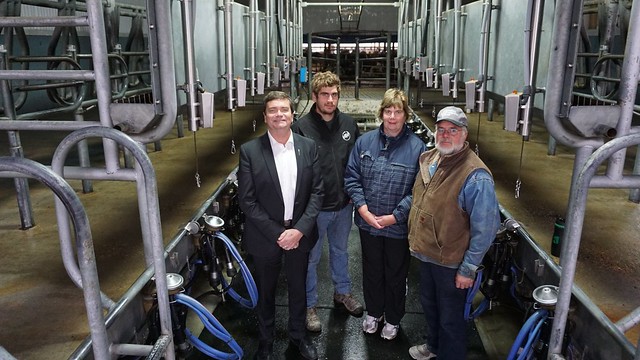This release was issued under a previous government.

Agriculture Minister Oneil Carlier with Jordan, Susan and Evan Schuurman at the Schuurman Dairy Farm
“In my discussions with agricultural producers, I have heard the importance of supporting greenhouses, dairy and livestock sectors in the transition to a lower carbon future. That’s why, in addition to our farm fuel rebate, we are putting additional funding in programs that will help producers become more efficient and reduce consumption, emissions and costs.”
“By pricing carbon, Alberta’s Climate Leadership Plan encourages all Albertans to become more energy efficient while reducing the pollution that causes climate change. Alberta’s agriculture sector has done a lot of important work to enhance environmental stewardship over the years. These programs demonstrate how we are continuing to support farmers in reducing the environmental footprint of their operations.”
“The energy-efficiency programs offered by the government gave us the incentive to move ahead with installing solar power on our operation. In addition to the environmental benefits that energy efficiency and solar power provide, we have found that by investing in solar power we have been able to lower our dairy operation’s power consumption by over 60 per cent.”
“The efficiency programs in Alberta have been very valuable to pork producers over the last few years. This latest announcement shows that government is working closely with industry to address energy-efficiency needs during the current downturn in hog pricing.”
“We appreciate this increased investment and shift in the government’s cost-shared portion of these programs and we hope this is a step toward more supports for agriculture in the future.”
“By expanding the cap on the irrigation-efficiency programs we will be able to do more to make our operations more efficient, which will reduce our energy costs and make better use of our water resources.”
The additional support is being provided through the industry-supported Climate Change Emissions Management Fund. The funding will support the expansion of the following programs:
- On-Farm Energy Management Program
Increase the percentage of capital purchases covered to 70 per cent from the current 35 per cent and increase the cap on funding to $750,000 (up from $50,000)
- On-Farm Solar PV Program
- Irrigation Efficiency Program
Increase the number of eligible projects by an applicant and increase the funding cap to $15,000 from $5,000 for specific types of projects
- Accelerating Agricultural Innovation Program
Allocate $1 million to help food processors retrofit their plants with energy-saving technology to help bridge funding until the Energy Efficiency Agency can be established.
The programs are projected to mitigate 120,000 tonnes of carbon emissions per year, which is the equivalent of taking more than 25,000 vehicles off the road for an entire year.
Managing climate change
All revenue from the carbon levy will be reinvested in Alberta’s economy, creating good jobs, diversifying our economy and fighting climate change.
Exemption for farm fuel
- The carbon levy will not apply to the use of marked gasoline and diesel by farmers for farming purposes.
- After the carbon levy is introduced in 2017, Alberta will have the third-lowest provincial fuel taxes/levies of any Canadian jurisdiction.
Rebates
- Carbon rebates will make sure lower- and middle-income individuals and families won’t have trouble making ends meet.
- Sixty per cent of Alberta households will receive the full amount of the rebate, which is based on the average costs of the carbon levy according to family size and income level, and an additional six per cent of Alberta households will receive a partial rebate.
Cuts to small business tax
- The Climate Leadership Plan cuts Alberta’s small business tax rate by one-third.
- With the Climate Leadership Plan’s small business tax cut, Alberta’s tax advantage for small business owners has increased. Alberta is the most competitive tax jurisdiction in Canada for small business.
Bioindustrial innovation
- Alberta Innovates’ support of the development of bio-industrial products by Ceapro has helped establish a clean-technology bioprocessing centre here. This is an example of diversifying our economy and creating jobs for Albertans.
Expanded agriculture energy efficiency programs
These programs will build on the success of four initiatives funded through the federal-provincial-territorial Growing Forward 2 agreement. Additional funding is being provided through the Climate Change Management Fund, which supports efforts to reduce greenhouse gas emissions and adapt to climate change. The programs are:
On-Farm Energy Management
- This program assists with the purchase of equipment that improves energy efficiency or monitors energy consumption. This includes lighting, pumps, meters, boilers, heaters and low-energy, livestock-watering fountains.
On-Farm Solar Management
- This program assists producers with the purchase of grid-connected solar panel systems that can be used to generate electricity and reduce emissions on farms.
Irrigation Efficiency
- This program helps producers invest in new or upgraded low-pressure irrigation equipment, improving water efficiency and reducing energy use.
Accelerating Innovation Program
- This has two streams. One is for agricultural societies, industry organizations and producer groups to collaborate through proof-of-concept and commercialization of new products, new processes or new business practices in Alberta.
- The second is targeted at primary producers, agri-processors and other for-profit companies to assist with the early adoption of new technologies or practices that have the potential for sector-wide impact.